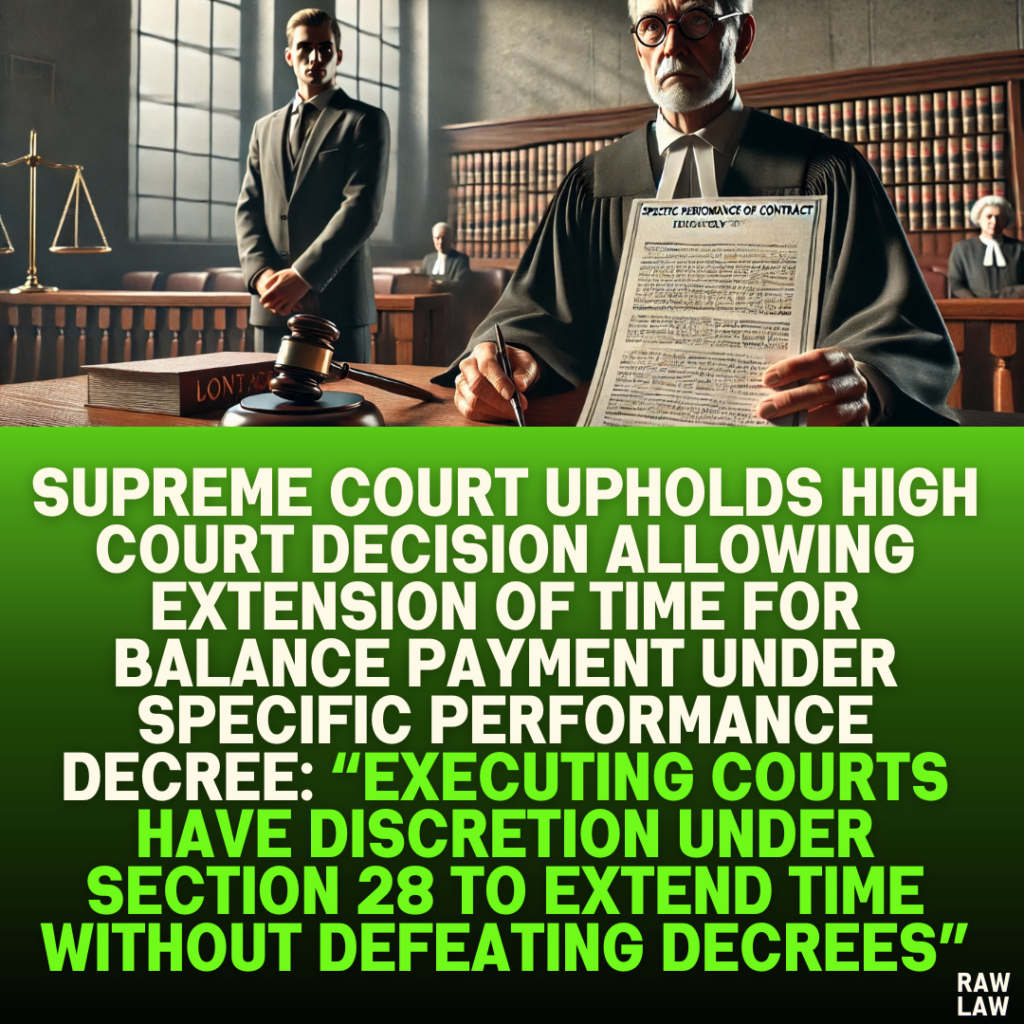Court’s Decision:
The Supreme Court dismissed the appeals filed by the judgment debtors (defendants) and upheld the High Court’s judgment affirming the orders of the executing court. The executing court had allowed the decree holders (plaintiffs) to deposit the balance sale consideration beyond the 20-day period initially prescribed by the trial court. The Court held that:
- The trial court retains jurisdiction to extend the time for compliance under Section 28 of the Specific Relief Act, 1963.
- There was no intentional default or unreasonable delay by the decree holders.
- The judgment debtors’ application to rescind the contract was rightly rejected.
Facts:
- Initial Trial Court Decrees:
- Four suits for specific performance of agreements to sell land were decreed in favor of the plaintiffs on 16 August 1994.
- The trial court directed the plaintiffs to deposit the balance sale consideration within 20 days, failing which the decrees would be rendered ineffective.
- First Appeal:
- The defendants filed appeals before the appellate court, which reversed the decrees.
- High Court Second Appeal:
- The plaintiffs challenged the reversal in second appeals before the High Court.
- On 3 May 2018 and 24 May 2018, the High Court allowed the second appeals, restoring the trial court’s decrees.
- Execution Proceedings:
- After the second appeals were allowed, the plaintiffs filed execution petitions on 4 September 2018 to enforce the decrees.
- They sought permission from the executing court to deposit the balance sale consideration, which was granted on 7 September 2018.
- Defendants’ Application for Rescission:
- The defendants filed applications under Section 28 of the Specific Relief Act, 1963, seeking rescission of the contracts due to non-compliance with the original 20-day deadline.
- The executing court rejected these applications, holding that the delay was neither unreasonable nor intentional.
- High Court Review:
- The High Court dismissed the defendants’ revision petitions and upheld the executing court’s orders.
- Supreme Court:
- The defendants appealed to the Supreme Court, which also dismissed their appeals, affirming the High Court’s judgment.
Issues:
- Can the executing court extend the time for compliance under Section 28 of the Specific Relief Act when the decree holder delays depositing the balance sale consideration?
- Does the doctrine of merger apply, making the High Court’s decree the operative one, thereby superseding the time limit set by the trial court?
- Were the decree holders’ delays intentional or unreasonable, warranting rescission of the contract?
Petitioner’s (Defendants’) Arguments:
- The trial court’s decree explicitly required the plaintiffs to deposit the balance sale consideration within 20 days. By failing to do so, the decrees should have been rescinded.
- The High Court’s judgment in second appeal restored the trial court’s decree, reviving its 20-day condition.
- The delay in deposit invalidated the plaintiffs’ rights to enforce the decrees.
Respondent’s (Plaintiffs’) Arguments:
- The trial court’s discretion under Section 28 to extend the time for deposit was rightly exercised.
- The High Court decree did not stipulate any specific timeline for deposit, and the plaintiffs acted promptly after the High Court’s decision.
- The delay was not intentional but arose from procedural circumstances.
Analysis of the Law:
1. Doctrine of Merger:
- When an appellate court affirms or modifies a decree, the original decree merges with the appellate decree.
- The Supreme Court reiterated that the High Court’s decree in the second appeal superseded the trial court’s decree, making the time stipulation in the original decree irrelevant.
2. Section 28 of the Specific Relief Act:
- This section allows the court to:
- Rescind the contract if the decree holder fails to comply with conditions.
- Extend the time for compliance, ensuring flexibility to meet the ends of justice.
- The Court emphasized that the trial court retains jurisdiction over specific performance decrees and can exercise discretion to extend deadlines.
3. Precedents:
- Kunhayammed v. State of Kerala (2000): Confirmed that the appellate decree becomes the operative one.
- Sardar Mohar Singh v. Mangilal (1997): Held that courts retain jurisdiction over specific performance decrees until full compliance.
- Prem Jeevan v. K.S. Venkata Raman (2017): Distinguished as the facts involved a much longer delay with no justifiable reasons.
Court’s Reasoning:
- Doctrine of Merger:
- The High Court’s decree restored the trial court’s order but did not impose a new time limit for compliance. Thus, the earlier 20-day limit was not revived.
- Conduct of the Decree Holders:
- The decree holders promptly filed execution petitions and deposited the balance sale consideration after obtaining the executing court’s permission. There was no indication of intentional default or delay.
- Section 28 Discretion:
- The trial court rightly exercised its discretion to extend the time for compliance, considering the overall circumstances.
- Judgment Debtors’ Application for Rescission:
- The Court found no valid grounds for rescission, as the delay was minimal and procedural rather than deliberate.
Conclusion:
The Supreme Court dismissed the appeals, holding that:
- The High Court rightly affirmed the executing court’s orders allowing the deposit of balance sale consideration.
- The doctrine of merger and Section 28 provided sufficient legal grounds to extend the time for compliance.
- The decree holders acted in good faith, and rescission of the contract was unwarranted.
Implications:
- Flexibility in Execution:
- Courts retain discretion under Section 28 to extend timelines, preventing technical defaults from defeating substantive rights.
- Doctrine of Merger:
- Clarifies that appellate decrees supersede trial court decrees, ensuring consistency in execution proceedings.
- Fairness in Equity:
- Reinforces the principle that minor procedural delays, absent bad faith, do not justify rescinding specific performance decrees.
